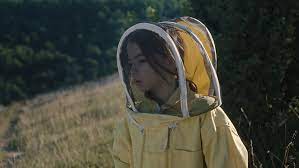252 total views, 1 views today
20,000 Species of Bees 2023 Movie Review
Our relationship to our gender and sexual identities is so overwhelmingly dictated in our formative years by the binary certitudes of family and culture it’s difficult to vocalize opposition to these assignations, especially for children. Patriarchal dogma often blinds us through its conditioning to how formidably invasive communal attitudes aggressively squelch any challenges to these systems, and such is the thrust of Estibaliz Urresola Solaguren’s narrative debut, 20,000 Species of Bees.
An eight-year-old child is experiencing gender dysphoria amidst a tumultuous summer in which their parents, naturally, are consumed by their own multitudinous troubles. Their behavior dismissed as confusion or rebellion is at last allowed a safe space thanks to an aunt in conjunction with a harried but loving mother during a family vacation in the Basque Country. Touching and without being overly sentimental, Solaguren uses the titular diversity of bees to suggest our authentic roles all play an important part if we are to move beyond surviving to actually thriving.
Aitor (Sofia Otero) is an eight-year-old boy who has been experiencing a rough patch his parents don’t quite know how to deal with. His older two siblings seem to have their own gripes with mom Ane (Patricia Lopez Arnaiz) and dad Gorka (Martxelo Rubio), whose marriage appears to be strained while Ane pursues a career change in pursuit of sculpting, her passion. While Aitor has begun to reject his name in favor of a more feminine family nickname, Coco, which also doesn’t seem to sit quite right, Ane has left their home in France to visit her family in the Basque country, where a whole other can of worms is waiting to be opened with her own mother.
Her aunt Lourdes (Ana Gabarain) tends the family’s beekeeping business, where honey and wax are harvested, and the insects are also used for medicinal purposes. As the week progresses, and it’s clear Ane’s intention was to use her deceased father’s workshop to craft a new piece she will need to complete in pursuit of a new teaching position, old skeletons begin to rattle, further distracting her from the gender norms being forced upon her child, who has decided to call themselves Lucia.
Intergenerational conflicts provide the backdrop of the recently minted Lucia’s development, her harried mother Ane grappling with her own identity as an artist whilst balancing marital issues. As Ane, Patricia Lopez Arnaiz soaks up Gina Ferrer’s frames as a captivating presence, distracted but supportive of her children. Together, with Ane Gabarain’s Aunt Lourdes, herself an outcast coded as lesbian, they represent the necessary kind of cheerleaders Lucia will require to succeed in their transition. As we navigate the family’s historical baggage amongst this mostly female crew, the constant throb of Solaguren’s script revolves around Lucia’s gender rebellion.
The inherent discomfort of public swimming pools, shopping for clothes, hairstyles, etc., are rife with anguish for Lucia. The initial arrival at the family residence solidifies a rift between the religious minded family members, as the false occasion for Ane’s visit is to attend her nephew’s baptism. Immediate comments regarding how Lucia’s older sister’s body has changed (in other words, she now has breasts) suggest it’s going to be a helluva long week.
And 20,000 Species of Bees does tend to belabor the point, but it’s easy for objective parties to nosedive into the frustrating obliviousness of adults who are so self-consumed with their own unresolved issues they fail to see obvious cues. But historically, these are inherently the kinds of behaviors systematically punished, stamped out and admonished. Curiously, Lucia’s father makes a point to suggest behaviors acceptable within closed doors are acceptable, but never in public, proving Lucia’s developments have been more than just subconsciously registered. As the week progresses, certain situations cannot be ignored thanks to the intervention of the kindly Lourdes, who doubles down on the bee metaphors in her alone time with Lucia.
Newcomer Sofia Otero navigates these frustrations through an impressive blend of emotional outbursts and silent resistance. While the film’s resolution is hopeful, there’s also a sense of narrative convenience, often taking pains to reformulate the obvious instead of allowing its more subtle cues to percolate (the about face of Gorka during the climax, for instance, feels a bit false). It doesn’t feel as progressive as, say, Alain Berliner’s 1997 film Ma Vie En Rose, detailing a similar transition, but 20,000 Species of Bees also serves as a reflection of a sense of progress being made, even if we’ve still a long way to go.
